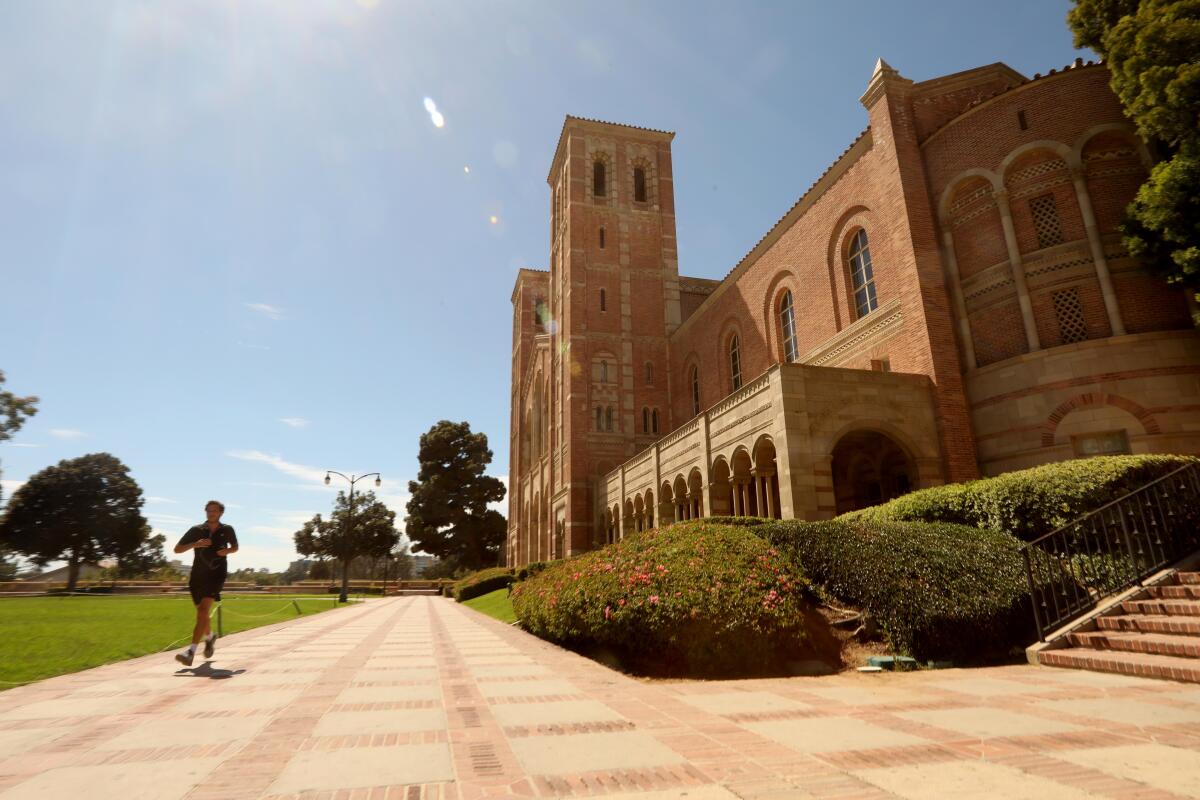State’s first EV-charging roadway planned for UCLA ahead of Olympics

- Share via
The state’s first electric-vehicle-charging roadway is expected to debut by the 2028 Olympics after a multimillion-dollar grant to UCLA — the site of Los Angeles’ Olympic Village.
For the record:
10:31 a.m. Dec. 2, 2024An earlier version of this article said a proposed transit hub at UCLA would connect to the D Line light rail extension. It is a subway extension.
Nearly $20 million will go to electrify the university’s BruinBus fleet and install underground charging for shuttles and buses along a route that stretches for less than a mile in Westwood. The grant will also fund a new transit hub between the UCLA bus depot and a planned UCLA/Westwood Metro station that would connect to the future D Line subway extension.
The buses would pick up charge while driving throughout the day or when parked at a stationary wireless charger. Several minutes spent at a stationary charger would offer a greater amount of charge than driving over it, said Clinton Bench, director of UCLA Fleet and Transit. In both cases, a vehicle would get at least the same amount of charge as it would from a wired charger.
“A wireless inductive option is a game changer … When a vehicle is driving over [a charger], the vehicle can collect charge while it’s moving,” Bench said, comparing the technology to a mobile-phone charger. “If you’re stationary at a stop and you had a five to seven minute layover ... that’s probably giving you a pretty good head start on your next route and reducing the amount of charge you need in the evening.”
The operation would save time by cutting out the need for a driver to hook up a vehicle to a charging port and would also offer flexibility for charging times. That would be especially beneficial during moments when the grid is heavily impacted, such as on a hot summer day.
“It’s even more of an opportunity to really balance that load on the grid over the course of the day,” Bench said.
The plan is to install inductive charging coils underground along Charles E. Young Drive between the Westwood Plaza intersection and Murphy Hall. Stationary chargers would also be added at passenger drop-off and pickup locations and transit depots where UCLA buses typically stop.
California is prepared to offer state tax rebates for electric vehicle purchases if the incoming Trump administration scuttles the federal EV tax credit, the governor said.
The grant came from California State Transportation Agency’s Transit and Intercity Rail Capital Program and was received in collaboration with clean transportation nonprofit CALSTART and wireless charging provider Electreon, whose technology was used to develop the nation’s first EV-charging roadway in Detroit last year.
“The world needs innovative, scalable solutions with transformative impact to advance electrification, and this project demonstrates California’s commitment to a more sustainable, efficient and accessible future,” Electreon’s vice president of business development Stefan Tongur said.
Only buses equipped with the technology will be able to utilize the roadway’s charging power. Bench hopes that the pilot program could lead to bigger possibilities in the future, such as the ability for people to charge while sitting in traffic.
“I’d love to get there someday,” he said.
For now, Bench said that the the goal is to get “at least some of the wireless charging functionality implemented and able to be used before the Olympics start.” The university will host athletes in its residence halls, as it did in 1984.
The announcement comes as state leaders have maintained their commitment to clean air initiatives amid President-elect Trump’s campaign promise to cut electric vehicle tax credits. Gov. Newsom recently said that the state is prepared to offer state tax rebates if the federal credit is eliminated.
More to Read
Sign up for Essential California
The most important California stories and recommendations in your inbox every morning.
You may occasionally receive promotional content from the Los Angeles Times.











